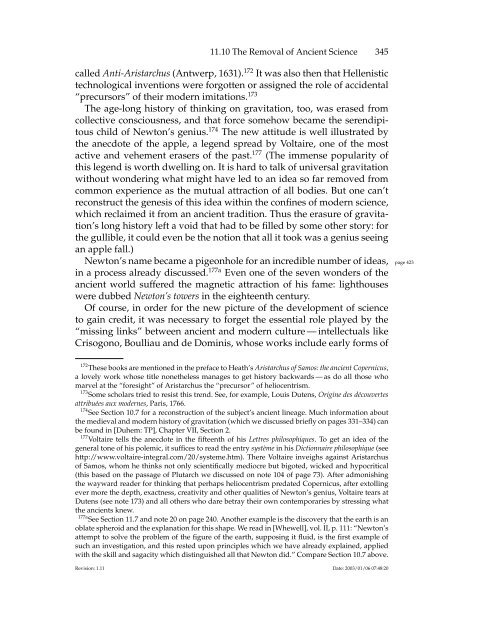1 The Birth of Science - MSRI
1 The Birth of Science - MSRI
1 The Birth of Science - MSRI
Create successful ePaper yourself
Turn your PDF publications into a flip-book with our unique Google optimized e-Paper software.
11.10 <strong>The</strong> Removal <strong>of</strong> Ancient <strong>Science</strong> 345<br />
called Anti-Aristarchus (Antwerp, 1631). 172 It was also then that Hellenistic<br />
technological inventions were forgotten or assigned the role <strong>of</strong> accidental<br />
“precursors” <strong>of</strong> their modern imitations. 173<br />
<strong>The</strong> age-long history <strong>of</strong> thinking on gravitation, too, was erased from<br />
collective consciousness, and that force somehow became the serendipitous<br />
child <strong>of</strong> Newton’s genius. 174 <strong>The</strong> new attitude is well illustrated by<br />
the anecdote <strong>of</strong> the apple, a legend spread by Voltaire, one <strong>of</strong> the most<br />
active and vehement erasers <strong>of</strong> the past. 177 (<strong>The</strong> immense popularity <strong>of</strong><br />
this legend is worth dwelling on. It is hard to talk <strong>of</strong> universal gravitation<br />
without wondering what might have led to an idea so far removed from<br />
common experience as the mutual attraction <strong>of</strong> all bodies. But one can’t<br />
reconstruct the genesis <strong>of</strong> this idea within the confines <strong>of</strong> modern science,<br />
which reclaimed it from an ancient tradition. Thus the erasure <strong>of</strong> gravitation’s<br />
long history left a void that had to be filled by some other story: for<br />
the gullible, it could even be the notion that all it took was a genius seeing<br />
an apple fall.)<br />
Newton’s name became a pigeonhole for an incredible number <strong>of</strong> ideas, page 423<br />
in a process already discussed. 177a Even one <strong>of</strong> the seven wonders <strong>of</strong> the<br />
ancient world suffered the magnetic attraction <strong>of</strong> his fame: lighthouses<br />
were dubbed Newton’s towers in the eighteenth century.<br />
Of course, in order for the new picture <strong>of</strong> the development <strong>of</strong> science<br />
to gain credit, it was necessary to forget the essential role played by the<br />
“missing links” between ancient and modern culture — intellectuals like<br />
Crisogono, Boulliau and de Dominis, whose works include early forms <strong>of</strong><br />
172<br />
<strong>The</strong>se books are mentioned in the preface to Heath’s Aristarchus <strong>of</strong> Samos: the ancient Copernicus,<br />
a lovely work whose title nonetheless manages to get history backwards — as do all those who<br />
marvel at the “foresight” <strong>of</strong> Aristarchus the “precursor” <strong>of</strong> heliocentrism.<br />
173<br />
Some scholars tried to resist this trend. See, for example, Louis Dutens, Origine des découvertes<br />
attribuées aux modernes, Paris, 1766.<br />
174<br />
See Section 10.7 for a reconstruction <strong>of</strong> the subject’s ancient lineage. Much information about<br />
the medieval and modern history <strong>of</strong> gravitation (which we discussed briefly on pages 331–334) can<br />
be found in [Duhem: TP], Chapter VII, Section 2.<br />
177<br />
Voltaire tells the anecdote in the fifteenth <strong>of</strong> his Lettres philosophiques. To get an idea <strong>of</strong> the<br />
general tone <strong>of</strong> his polemic, it suffices to read the entry système in his Dictionnaire philosophique (see<br />
http://www.voltaire-integral.com/20/systeme.htm). <strong>The</strong>re Voltaire inveighs against Aristarchus<br />
<strong>of</strong> Samos, whom he thinks not only scientifically mediocre but bigoted, wicked and hypocritical<br />
(this based on the passage <strong>of</strong> Plutarch we discussed on note 104 <strong>of</strong> page 73). After admonishing<br />
the wayward reader for thinking that perhaps heliocentrism predated Copernicus, after extolling<br />
ever more the depth, exactness, creativity and other qualities <strong>of</strong> Newton’s genius, Voltaire tears at<br />
Dutens (see note 173) and all others who dare betray their own contemporaries by stressing what<br />
the ancients knew.<br />
177a<br />
See Section 11.7 and note 20 on page 240. Another example is the discovery that the earth is an<br />
oblate spheroid and the explanation for this shape. We read in [Whewell], vol. II, p. 111: “Newton’s<br />
attempt to solve the problem <strong>of</strong> the figure <strong>of</strong> the earth, supposing it fluid, is the first example <strong>of</strong><br />
such an investigation, and this rested upon principles which we have already explained, applied<br />
with the skill and sagacity which distinguished all that Newton did.” Compare Section 10.7 above.<br />
Revision: 1.11 Date: 2003/01/06 07:48:20










